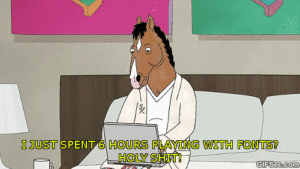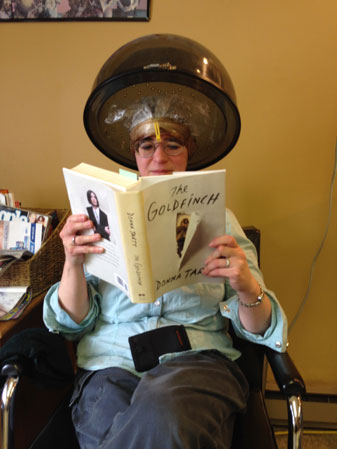Week Three of my captivity: We have decided “The Magic Schoolbus” counts as homeschooling. I have a slight crush on Ms. Frizzle (that sultry voice!). Doing a 500-piece Harry Potter jigsaw puzzle despite not caring about Harry Potter or puzzles. Bought four pints of ice cream today, even though only weird flavors like Whiskey Hazelnut Latte were left. At least that’s what I think it’s called; I could hardly see because my face mask was fogging up my eyeglasses. For some reason I thought this was a good time to start binge-watching “Bojack Horseman”, perhaps so I’m not tempted to consume the alcohol-laced desserts too fast. Also have a slight crush on Mr. Peanut Butter.
If you want more coronavirus news, it’s at the end of the post. I thought we could all use a distraction.
Gay literary fiction author Garth Greenwell was all over the news at the beginning of 2020 for his new book Cleanness, a sequel to his award-winning debut What Belongs to You, about an American teacher in Bulgaria whose sexual encounters reflect his existential crisis of both wanting and rejecting intimacy. In this interview at Craft Magazine, Greenwell shares insights about, among other things, the connection between queerness and literary technique:
I’m interested in the way that the shapes we make in art can mirror or resemble or question or complicate the shapes we make in pleasure. One of the things that interests me about queerness in art is I do think that novel affective and sexual arrangements demand novel forms…
[T]he idea that I hear in fiction workshops espoused as an ideal of good narrative-making is that you have a story that has a dominant plot and subplots, and you have a story that has a through line, you have a story that has a center. All of those things are fundamentally monogamous, they’re fundamentally predicated on the idea of life as monogamous, as life being drawn to a single affective center. Well, what if life doesn’t look like that? Then it seems to me that your story could have a very different shape.
And yes, I guess I am interested in the idea, it’s a very old idea, that fundamental idea we have of ideal structures in art as gendered, and that they are connected to sex. That’s an idea I encountered first as a music student in the 1990s reading feminist musicology, that many of our ideas of musical structure basically seem to resemble male orgasm. Feminist musicologists and feminist music theorists [were] sort of asking, what would music look like if instead of taking the experience of the male orgasm as our primary experience of transcendence, we took the experience of female orgasm? What would that look like? How would that change what art might be? That seems to me a really profound question and one that it’s not the kind of question you answer, but that you might explore in art. To me, it’s a question that unsettles my sense of what art can do. The way that I feel like I grow as an artist is by seeking out questions that unsettle my sense of what art can do.
Greenwell also pushes back against the pressure to create unambiguously “positive” representation, saying that as a gay teen in “pre-Internet Kentucky”, even tragic literature about homosexuality was liberating because “it gave me a sense of my life as accommodating of dignity.” He concludes:
I think the relevance of art to our lives is always endlessly mysterious, and never corresponds to a one-to-one relation of “I need a story to suggest to me that my life can be bearable and I can have the life I want to have.” I don’t think that’s how art works, and I think it’s really important to remember that. Any time we feel, as I think as a culture we are expressing this very much, very often, that we can place those kinds of claims on art—we cannot. It is illegitimate, I think, to ever tell an artist they have a responsibility to represent reality in a certain way.
AU: America’s AIDS Magazine last month profiled 80-year-old artist and activist Jack Fritscher, a former Catholic seminarian whose eclectic projects included the 1972 book Popular Witchcraft. Fritscher said: “During the Sixties sexual revolution and the Catholic Church’s Vatican Council revolution, it seemed worthwhile to research witchcraft as another evolving theology in American pop culture.” I was struck by his description of creative synergy:
I am not a Satanist. I’m a journalist. I’m also a magician. As an erotic writer, I conjure sex magic to seduce readers into transformative orgasm by casting the ‘spell’ of words into erotic runes that burn the reader down.
Another gay elder, prolific children’s book writer-illustrator Tomie dePaola, passed away last month. His distinctive artwork, with plush rounded forms and gentle colors, was a fixture of our 1970s childhoods. I particularly remember cherishing The Cloud Book and The Clown of God. When Shane was a toddler, a friend gave us a board book of dePaola’s Strega Nona, about a witch with a magical pasta pot (#lifegoals). See his complete bibliography on his website.
Poet and nonfiction writer J Brooke recently won Columbia Journal’s Womxn’s History Month Special Issue contest with eir excellent, nuanced essay “Hybrid”, about the many permutations of eir gender identity from childhood to middle age. Now the parent of a young trans man, Brooke reflects on the similarities and differences in how they both express their masculine sides. E describes an epiphany from reading Chas Bono’s transition memoir in eir 40s:
Born a boy in a female body, Chas eventually realized he needed to transition into a man. With such similar early years, I wondered, for the first time, if I’d denied myself my true gender. And, if I had, now what was I supposed to do about it?
…Exploring with a therapist whether I still wanted to be the male I’d wanted to be back in my teens, I discovered that while I would have blinked my breasts away at any point in my life, my aversion to surgery would keep me from an elective double mastectomy. As for facial hair, I’d outgrown my desire for it along with my silver spoon shaving years. Learning how testosterone alters the brain, I didn’t want that either…liking the wiring of my female-male brain, however it’s been fused and formed over the years. And, while I’d once perfected peeing while standing, I didn’t wish a penis appended to my body. I was born male and yet no longer felt wholly male; I had morphed into something other.
My favorite poet-mystic Ariana Reines lays down some astrological wisdom in her March 23 New Moon Report. Writing about our new default state of enforced solitude and quiescence, Reines declares:
In order to handle it, the luckiest among us—those of us who are staring down the barrel of nothing worse than boredom and loneliness—are going to need skills and commitment on the level of the great yogis and saints, of deeply committed artists—simply to remain sane, or rather to attain sanity.
What we are facing right now is death.
And somehow I wish neither to give comfort about this fact nor do I wish to scold you about those people and causes to whom and to which you should be devoting your copious spare time and, very likely, dwindling material resources.
There are things I could say about what artists know about being alone, about the transubstantiation of loneliness into solitude that has guided us spiritually since the Buddha first left his wife and kids to wander and sit under that tree . . . and long before that . . . I could preach to you about the touchless touch of the unified field, the negative space that unites us all, about the substance of our love and longing dilating like the auras all about us, about the immanence of God and the reality of angels, about how lucky we are to have the internet and how lucky we are to finally have a chance to learn how to use it for good instead of evil . . .
But I need to remind myself and you that what we are facing is death. It’s not just that people we love will die, but that every time we wash our hands and every day we don’t go outside, mathematically, fewer people will die. We have been drawn into a new calculus. But it isn’t just this either. I suspect we’re also moving into the death of the era in which any of us belongs sitting quietly alone in a room. Whatever America has been, and whatever we have been, we are facing its death.
And in another sense we are all pregnant and this is our lying-in…
…And what about solitude’s products? What about great works of art? These lonesome productions of genius seem to me now like melancholy miracles of an epoch that has devoured without pity the real genius of this place, by which I mean Earth—the cultures, animals, plants, and spirits—hundreds and thousands of spirits, of every description and disposition—that have lived and even thrived here. It has occurred to me that art simply returns to the world some of the abundance it has given us, in the same way that in elder cultures song and ritual would do, and it has occurred to me that art restores balance to the world, which is tilted on purpose, and that there is something about this gift—compelled as it is from us—that is especially hard to accomplish with things set up the way we’ve organized them since the Industrial Revolution.
We cannot live without art, but the Promethean force required to bring it forth is immense, is even sick, an index of our greater sickness. It takes a quantity of human grit to accomplish anything great that I don’t see how any school could teach. And now everyone gets to have a taste of it: what it means, and what it takes to be thrown back on yourself, and to summon out of absolutely nothing, less than nothing, some kind of treasure, some kind of nectar on which not only you but others might feed, something deeper than food and older than even ideas and without which your soul would die.
Need a laugh? How about art produced without tears? Janelle Shane’s neural networks are here for you. Neural networks are computer learning programs that look at large data sets to generate other possible examples of the same genre–sometimes accurately, sometimes hilariously off-kilter. Here, the AI has applied itself to in rem jurisdiction lawsuits, a/k/a “Court Cases That Sound Like the Weirdest Fights”.
One of the quirks of the US legal system is that in certain cases the court will set up a case against inanimate objects–something to do with the process of seizing contraband or dangerous goods…
Some of the strangest have included:
United States v. Approximately 64,695 Pounds of Shark Fins
United States v. 12 200-ft. Reels of Film
United States v. One Book Called Ulysses
United States v. One Tyrannosaurus Bataar Skeleton
United States v One Solid Gold Object In The Form Of A Rooster
Quantity of Books v. Kansas
South Dakota v. Fifteen Impounded Cats
Those are the real ones. The REAL ONES.
What would they be like when imitated by a neural net?
A couple of months ago, the AI’s United States v. Two Packs of Filthy Watermelon Pretzels sounded like a farce; now it’s a description of the stripped shelves at Walmart. What a world.
I’ll give the last word to horror novelist Chuck Wendig, whose funny and foul-mouthed writing advice brightens my Twitter feed. He wants to remind us that “None of This Is Normal”:
You cannot meet abnormality with increased normalcy. It just doesn’t work. There’s no countermanding it that way. We’re told we can be more productive, that we’re all work-from-home now, but lemme tell you: this isn’t your average way to work-from-home. This isn’t how to accelerate productivity. It’s like being told to work-from-home during a locust plague and a forest fire. “Just sit there and do the work, head down, don’t look outside, definitely don’t match eyes with Baalzebub, who is currently stalking the neighborhood next door with a SCYTHE made of BITING FLIES. It’s fine! Ha ha ha! Haven’t you always wanted to learn how to crochet? Now’s the time! Just ignore the screaming!”
It’s hard to concentrate when everything is so strange, so broken, so dangerous. It’s like being told to paint a masterpiece while on a turbulent flight. It’s just not the time.
And so, I want you to know, you shouldn’t expect yourself to be somehow a better, more productive person in this time. You can be! If you are, more power to you. That doesn’t make you a monster. But if you’re finding yourself unable to concentrate, that’s to be expected. That is normal. Normal is feeling abnormal in response to abnormality. You must be kind to yourself and to others when it comes to what we think people can and should be able to accomplish during this time. Ten million people are out of work, suddenly. People are sick and dying. The thing we crave at a base level, human interaction, is suddenly fraught and fragile. Hell, everything is fraught and fragile. We’re only realizing now that it was fragile all this time.
Maybe I won’t try to finish my novel by Easter.















